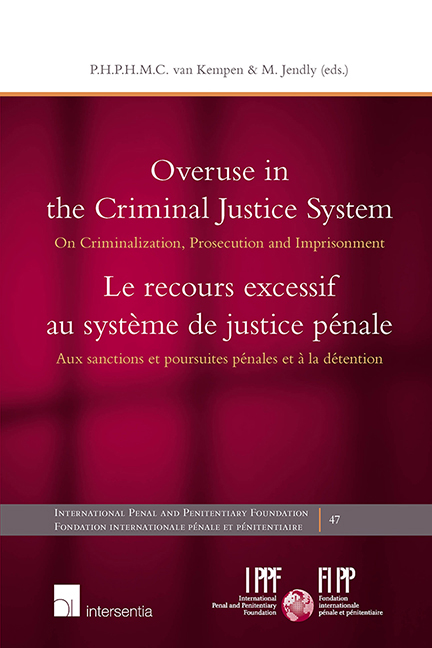Book contents
- Frontmatter
- Dedication
- Contents
- Acknowledgements
- Remerciements
- PART I INTRODUCTORY SYNTHESIS AND ANALYSES 1ÈRE PARTIE. SYNTHÈSE ET ANALYSES INTRODUCTIVES
- PART II THEMES 2ÈME PARTIE. THÈMES
- Overuse of the Criminal Justice System: Analytical Approach, Rules and Practices
- The Overuse of Criminal Justice in the Case Law of the European Court of Human Rights
- Overuse of Criminalization: a Philosophical and Political Approach on the Latin-American Situation
- Overprosecution and Negotiated Justice in Europe
- The American Experience with the Prosecutorial Overuse of Plea Bargaining
- Overuse of Imprisonment: Statistical Analyses of Incarceration Rates Across the World
- Minimising Prisonisation and the Harms of Custody
- Criminal Policy and Imprisonment. The Case of Lithuania: Open Prisons, Prison Leave and Release on Parole
- PART III NATIONAL REPORTS 3ÈME PARTIE. RAPPORTS NATIONAUX
- The International Penal and Penitentiary Foundation: history and purpose
- La Fondation internationale pénale et pénitentiaire: histoire et objectif
- The IPPF Series
Overuse of the Criminal Justice System: Analytical Approach, Rules and Practices
from PART II - THEMES 2ÈME PARTIE. THÈMES
Published online by Cambridge University Press: 26 June 2019
- Frontmatter
- Dedication
- Contents
- Acknowledgements
- Remerciements
- PART I INTRODUCTORY SYNTHESIS AND ANALYSES 1ÈRE PARTIE. SYNTHÈSE ET ANALYSES INTRODUCTIVES
- PART II THEMES 2ÈME PARTIE. THÈMES
- Overuse of the Criminal Justice System: Analytical Approach, Rules and Practices
- The Overuse of Criminal Justice in the Case Law of the European Court of Human Rights
- Overuse of Criminalization: a Philosophical and Political Approach on the Latin-American Situation
- Overprosecution and Negotiated Justice in Europe
- The American Experience with the Prosecutorial Overuse of Plea Bargaining
- Overuse of Imprisonment: Statistical Analyses of Incarceration Rates Across the World
- Minimising Prisonisation and the Harms of Custody
- Criminal Policy and Imprisonment. The Case of Lithuania: Open Prisons, Prison Leave and Release on Parole
- PART III NATIONAL REPORTS 3ÈME PARTIE. RAPPORTS NATIONAUX
- The International Penal and Penitentiary Foundation: history and purpose
- La Fondation internationale pénale et pénitentiaire: histoire et objectif
- The IPPF Series
Summary
AN ANALYTICAL APPROACH
To properly assess to what extent a national crime control system overuses the punitive means at its disposal, it has to be established first what the legitimate goals are that the system must pursue through those means. Therefore, we need to adopt a precise analytical approach before being able to evaluate the abuses into which crime control actors could be falling. We deal with this topic in the following two sections.
PUNITIVE MODERATION AS AN OBJECTIVE
Current criminal policy has a strong tendency to compare different national crime control systems from the single perspective of their punitiveness. Punitive rigorousness or moderation has become the point of reference for most comparative analyses of ongoing criminal policy in different countries. Moreover, this approach has gradually gained significance as an evaluation criteria of national crime policies.
This framework assumes that national crime control systems, as they develop the necessary social interventions to obtain their preventive aims, should make sure that crime control does not inflict more social suffering than strictly necessary. It means that criminalization should not go beyond what might be considered vital for protecting essential public interests, and that those, either suspects or offenders, subjected to criminal law enforcement bodies will experience moderate and proportional distress as a result of their behaviour. This objective is so relevant that it justifies that comparative criminal policy evaluations are guided in accordance of the degree to which different national systems come closer to an optimum of punitive moderation, notwithstanding the achievement of preventive goals.
It is important to question why, despite the strong moral and cultural dependence to which the ideas of criminal restraint or rigor are subjected to, this approach has got itself into such a big predicament. Some reasons are worth mentioning. The hypothesis that most Western countries are moving towards a progressive harshening of the penal system has been very suggestive, and has permeated the criminal justice policy discussion. In turn, a program aimed at reducing the punitive pressure commonly has support amongst the field of criminal policy reflection. In addition, it has influenced the conceptual clarity and strength of this view, suggesting that a few indicators can explain it. Indeed, we should not forget that from the outset it has used easily accessible indicators of punitiveness, which has certainly increased its appeal.
- Type
- Chapter
- Information
- Overuse in the Criminal Justice SystemOn Criminalization, Prosecution and Imprisonment, pp. 47 - 66Publisher: IntersentiaPrint publication year: 2019



